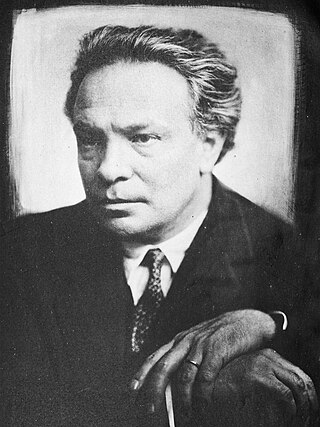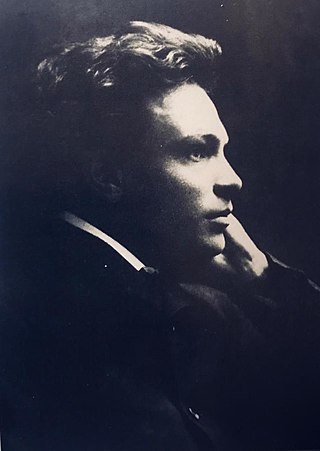
Ottorino Respighi was an Italian composer, violinist, teacher, and musicologist and one of the leading Italian composers of the early 20th century. His compositions range over operas, ballets, orchestral suites, choral songs, chamber music, and transcriptions of Italian compositions of the 16th–18th centuries, but his best known and most performed works are his three orchestral tone poems which brought him international fame: Fountains of Rome (1916), Pines of Rome (1924), and Roman Festivals (1928).
Roman Festivals, P 157 is a tone poem in four movements for orchestra completed in 1928 by the Italian composer Ottorino Respighi. It is the last of his three tone poems about Rome, following Fountains of Rome (1916) and Pines of Rome (1924), which he referred to as a triptych. Each movement depicts a scene of celebration in ancient and contemporary Rome, specifically gladiators battling to the death, the Christian Jubilee, a harvest and hunt festival, and a festival in the Piazza Navona. Musically, the piece is the longest and most demanding of Respighi's Roman trilogy.
Pines of Rome, P 141, is a tone poem in four movements for orchestra completed in 1924 by the Italian composer Ottorino Respighi. It's the second of his three tone poems about Rome, following Fontane di Roma (1916) and preceding Feste Romane (1928). Each movement depicts a setting in the city with pine trees, specifically those in the Villa Borghese gardens, near a catacomb, on the Janiculum Hill, and along the Appian Way. The premiere was held at the Teatro Augusteo in Rome on 14 December 1924, with Bernardino Molinari conducting the Augusteo Orchestra, and the piece was published by Casa Ricordi in 1925.

Der Zwerg, Op. 17, is an opera in one act by Austrian composer Alexander von Zemlinsky to a libretto by Georg C. Klaren, freely adapted from the short story "The Birthday of the Infanta" by Oscar Wilde.

Eine florentinische Tragödie, Op. 16, is an opera in one act by Alexander von Zemlinsky composed in 1915–16 to a libretto adapted by the composer from a German translation by Max Meyerfeld of Oscar Wilde's unfinished play A Florentine Tragedy.

La campana sommersa is an opera in four acts by Italian composer Ottorino Respighi. Its libretto is by Claudio Guastalla, based on the play Die versunkene Glocke by German author Gerhart Hauptmann. The opera's premiere was on 18 November 1927 in Hamburg, Germany. Respighi's regular publisher, Ricordi, was displeased by his choice of subject, and refused to publish the opera. This led to its being published by the German publisher Bote & Bock, and a German premiere.

Der Mond is an opera in one act by Carl Orff based on a Grimm's fairy tale with a libretto by the composer. It was first performed on 5 February 1939 by the Bavarian State Opera in Munich under the direction of Clemens Krauss. The composer describes it not as an opera but as Ein kleines Welttheater ; the performance lasts for about one hour and is often paired with Orff's Die Kluge.

Maria egiziaca is an opera in one act, in three episodes, by the Italian composer Ottorino Respighi. The libretto, by Claudio Guastalla, is based on a Medieval life of Saint Mary of Egypt, contained in the translation into the vernacular of the Vitae Patrum written by Domenico Cavalca.

Belfagor is an Italian-language opera by the composer Ottorino Respighi to a libretto by Claudio Guastalla (1880–1948) based on the comedy Belfagor of Ercole Luigi Morselli (1882–1921), itself loosely based on the novella Belfagor arcidiavolo by Niccolò Machiavelli. It was premiered in 1923 at La Scala in Milan, under the baton of Antonio Guarnieri, since Toscanini was unavailable. The cast featured Irish soprano Margaret Burke Sheridan as Candida, baritone Mariano Stabile as her lover Baldo, and tenor Francesco Merli as the titular Belfagor, an arcidiavolo (Archdemon) who tries to marry a human maiden while in disguise as a nobleman, using gifts of money to her father.

La fiamma is an opera in three acts by Ottorino Respighi to a libretto by Claudio Guastalla based on Hans Wiers-Jenssen's 1908 play Anne Pedersdotter, The Witch. The plot is loosely based on the story of Anne Pedersdotter, a Norwegian woman who was accused of witchcraft and burnt at the stake in 1590. However, Respighi and Guastalla changed the setting of the opera to 7th century Ravenna. The melodramatic tale involves the illicit love of Silvana, the daughter of a witch, for her stepson Donello. When her husband Basilio dies of a heart attack, Silvana is accused of causing his death by witchcraft and is condemned to death. La fiamma premiered to considerable success on 23 January 1934 at the Teatro Reale dell'Opera in Rome in a performance conducted by Respighi himself. The production was directed by Alessandro Sanine with sets designed by Nicola Benois.

Kleider machen Leute is a comic opera in a prologue and two acts by Austrian composer Alexander Zemlinsky. The libretto was written by Leo Feld, based on the 1874 novella of the same name by Gottfried Keller.
Overture Respighiana is an overture composed by Salvatore Di Vittorio in 2008, as an homage to Ottorino Respighi, one year after completing Respighi's rediscovered first Violin Concerto in A Major.

Marie Victoire is a French-language opera in four acts by the composer Ottorino Respighi to a libretto by Edmond Guiraud (1879–1961) based on his French-language play of the same name, set in the French Revolution.

Ennio Porrino was an Italian composer and teacher. Amongst his compositions were orchestral works, an oratorio and several operas and ballets. His best known work is the symphonic poem Sardegna, a tribute to his native Sardinia, which premiered in Florence in 1933.
Il trionfo di Clelia, Wq. 31, is an opera composed by Christoph Willibald Gluck. It takes the form of a dramma per musica in three acts. The Italian-language libretto by Pietro Metastasio is based on several semi-legendary narratives concerning the founding of the Roman Republic. The opera premiered on 14 May 1763 at the Teatro Comunale di Bologna. Although rarely performed since then, it was revived in London in 2012 at the Royal Opera House's Linbury Studio.

Claudio Guastalla was an Italian opera librettist.

Semirâma is an opera in three acts by Ottorino Respighi to a libretto by Alessandro Cerè based on Voltaire's 1748 play Sémiramis, the same subject used for Rossini's Semiramide. Semirâma premiered on 20 November 1910 at the Teatro Comunale di Bologna. The première obtained a great success, with several calls for the composer and the singers.

La bella dormente nel bosco is an opera in three acts by Ottorino Respighi to a libretto by Gian Bistolfi based on Charles Perrault's fairy tale "Sleeping Beauty".

Re Enzo is an opera in three acts by Ottorino Respighi to a libretto by Alberto Donini. Re Enzo premiered on 12 March 1905 at the Teatro del Corso in Bologna. The singers were amateurs selected in the world of the Bolognese students; among them, Rosina Giovannoni Zacchi as Lauretta and Ernesto Lavarello as Leonzio. Following the will of the composer, there was a single performance, which obtained a good success.

Maria Carbone was an Italian operatic soprano. She created the lead female roles in two of Gian Francesco Malipiero's operas: the title role in Ecuba and Cleopatra in Antonio e Cleopatra.










